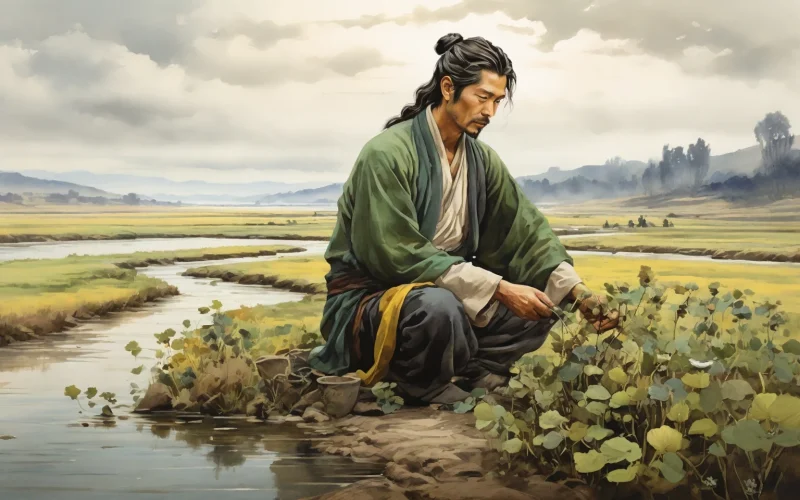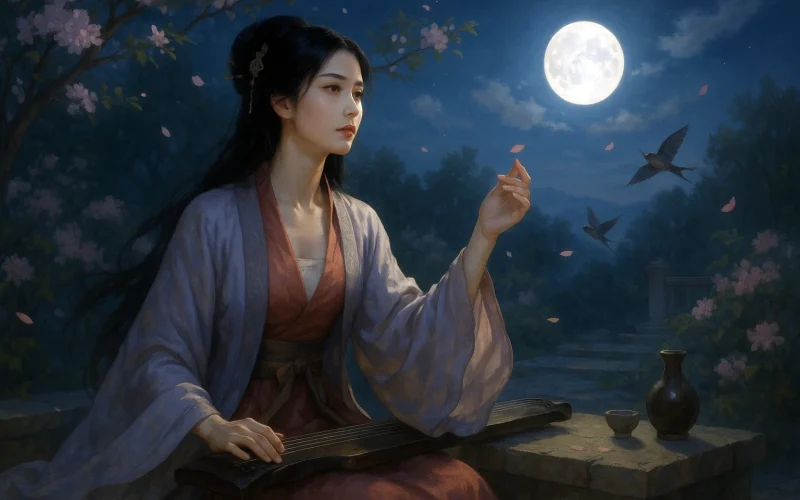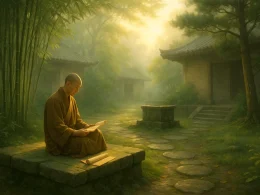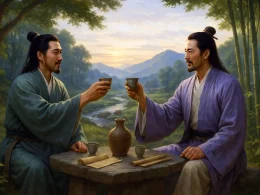Mulberries plant'd along the River Long,
Their leaves'll be gathered in three years in throng.
Maybe when boughs and twigs begin to sprout,
Suddenly flood from the mountains break out.
Branches and leaves would be torn from the trees,
Even trunks and roots might float to the seas.
The vernal Silkworms have no leaves to eat.
What could warm up your body, hands and feet?
With mulberries planted in places high,
When flood comes, you need not regret and sigh.
Original Poem
「拟古 · 其九」
陶渊明
种桑长江边,三年望当采。
枝条始欲茂,忽值山河改。
柯叶自摧折,根株浮沧海。
春蚕既无食,寒衣欲谁待?
本不植高原,今日复何悔!
Interpretation
Composed around 420 AD during the tumultuous transition between the fallen Jin dynasty and Liu Yu's usurpation establishing the Song regime, this poem expresses Tao Yuanming's profound grief over his native dynasty's collapse. Using mulberry cultivation as political allegory, it mourns Emperor Gong of Jin's deposition while revealing the historical lesson of self-inflicted destruction through over-reliance on powerful ministers. The work simultaneously demonstrates Tao's clear-eyed understanding of dynastic cycles and his unwavering moral compass.
First Stanza: "种桑长江边,三年望当采。"
Zhǒng sāng Cháng jiāng biān, sān nián wàng dāng cǎi.
"By Yangtze's banks mulberries were sown,
Three years' growth should have made them grown."
Symbolizes the three-year reign of Emperor Gong of Jin and its unfulfilled potential.
Second Stanza: "枝条始欲茂,忽值山河改。"
Zhī tiáo shǐ yù mào, hū zhí shān hé gǎi.
"Branches just reaching flourishing state,
When rivers and mountains met their fate."
Metaphors the Jin dynasty's aborted revival and the sudden dynastic overthrow.
Third Stanza: "柯叶自摧折,根株浮沧海。"
Kē yè zì cuī zhé, gēn zhū fú cāng hǎi.
"Boughs and leaves now broken lie,
Roots adrift on seas that die."
Depicts the complete collapse of state structures and the exile of royal lineage.
Fourth Stanza: "春蚕既无食,寒衣欲谁待?"
Chūn cán jì wú shí, hán yī yù shuí dài?
"Silkworms now lack their nourishing fare,
Who'll provide winter's clothing to wear?"
The silkworm metaphor reveals the people's destitution after national collapse.
Fifth Stanza: "本不植高原,今日复何悔!"
Běn bù zhí gāo yuán, jīn rì fù hé huǐ!
"Never should they by low riverside grow,
What use regret comes now too slow!"
Concludes with devastating political critique of Jin's strategic failures.
Holistic Appreciation
This poem employs the life cycle of mulberry trees as a profound metaphor for the vicissitudes of national destiny. Through vivid natural imagery, Tao Yuanming expresses both heartfelt lament for the fallen Jin dynasty and penetrating historical reflection. The opening stanzas' hopeful planting gives way to abrupt devastation as flourishing branches meet catastrophic change—a concise yet powerful encapsulation of dynastic collapse. The imagery of shattered boughs and uprooted trees floating adrift mirrors the people's suffering in the aftermath, like silkworms without leaves to sustain them. The concluding lines deliver a piercing verdict: the Jin court's fatal error lay in abandoning its foundations and relying on external powers, making present regrets meaningless. With profound emotion and austere lyricism, the poem compresses the tragedy of fallen kingdoms into devastating brevity.
Artistic Merits
This work masterfully embodies the classical technique of conveying profound ideals through natural imagery while embedding deep emotion within scenic depictions. The poet's allegorical brilliance transforms the humble act of mulberry cultivation into a powerful metaphor for statecraft, and the delicate silkworm into a symbol of the common people. Through this artistic transmutation, grand historical narratives become intimately intertwined with personal existential experience. The emotional journey unfolds organically from initial hopeful anticipation to devastating disappointment, moving through heartfelt lament before arriving at sober historical reflection.
The poem's seemingly simple language belies its profoundly melancholic atmosphere, simultaneously expressing boundless sorrow for the fallen dynasty and clear-eyed understanding of historical causality. This duality captures the essential tension in Tao Yuanming's worldview - his philosophical detachment from worldly power coexisting with deep compassion for the people's welfare. The mulberry metaphor ultimately reveals a fundamental truth about governance: that foundational choices determine historical outcomes. What appears as a botanical narrative becomes both a poignant elegy for lost dynasties and an enduring treatise on political wisdom, demonstrating how Tao could contemplate the eternal through the ephemeral, finding universal significance in rural simplicity.
Insights
This poem enlightens us that the rise and fall of nations is never accidental - the solidity of foundations and righteousness of governance determine their ultimate fate. Through the metaphors of mulberry trees and silkworms, Tao Yuanming warns humanity: those who rely on powerful ministers and lose their self-reliant foundations will ultimately reap what they sow. This profound historical reflection and vigilant awareness not only carries strong contemporary significance, but also reflects the noble character of a poet who, though dwelling in mountain forests, kept the common people in his heart and cared deeply for the world. Facing life's vicissitudes, we should all the more hold fast to our true selves, maintain independence and self-strengthening, and not drift with the tide.
Poem translator
Xu Yuanchong (许渊冲)
About the poet

Tao Yuanming(陶渊明), 365 – 427 CE, was a poet, literary figure, fu writer, and essayist active during the late Eastern Jin and early Liu Song dynasties. Born in Chaisang (near present-day Jiujiang, Jiangxi Province), he pioneered a new genre of pastoral-themed literature, expressing profound philosophical insights through simple language. His poetic style became an enduring aesthetic standard in classical Chinese poetry.












